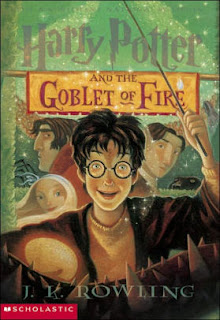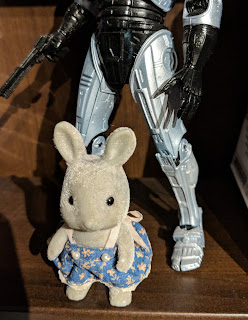Harry Potter and the Goblet of Fire
 Harry Potter and the Goblet of Fire
Harry Potter and the Goblet of FireJ. K. Rowling, 2000
Hugo Winner - 2001
Premise: ... It's Harry Potter.
Throughout this project to read all the Hugo-winning novels (moving into its ninth year!) I have tried to read and review these books with care. I try to explain when I hit a book that I don't like but I can understand its importance. I try to bear in mind the books' historical and cultural context; in fact, understanding each book's context is a lot of the pleasure in this quest to read them all. At the same time, I try to take each book as a unique work of literature and evaluate what I see as its merits and flaws for today's reader.
I was stumped by this book.
Harry Potter is too ubiquitous. I know too much about the characters, the world, fan commentary, meta analysis, etc. to be able to read it with anything resembling an open mind.
And I don't even seek out Harry Potter content. I just hang out on the geeky parts of the internet.
Although maybe I would have been skeptical about this book no matter what. After all, I've never actually liked Harry Potter that much. I quit the first book partway through and didn't go back until after the first few movies came out. I used to say that I thought people should just watch the movies until at least book 4. I liked book 5 when I read it, but then (in my opinion) book 6 was all setup and book 7 was a tedious slog. (Something the movies, unfortunately, re-created faithfully.) I deeply appreciate the way the series made reading cool, but I have never really enjoyed it.
I hoped that maybe rereading one would change my mind, but I spent the first three-quarters of this book frustrated and bored. Some random thoughts:
- How would it have been different if the Dursleys were more than feeble caricatures and fat jokes?
- There's got to be a better balance between writing realistic child characters and writing absolute morons who insist on creating problems for themselves.
- Oh, all that business with Hermione and the house elves is so, so much worse than I remembered.
- Also, she lies to a teacher so she'll be magically made more attractive. (Realistic behavior? Possibly. Kind to young readers? No.)
- It's so dumb that the tournament is stretched out over a whole year but only takes like a few days total.
- I just don't empathize with or enjoy reading characters being low-key terrible to each other/idiots because they're young.
So at this point, I'm just speeding through, and thinking why the heck did this win the Hugo?
Oh right, the ending.
The whole book turns on a freaking dime and the stakes shoot through the roof.
Now, the book nearly derails it all with several long villain monologues that belabor every last detail in ludicrous depth. But at the end, you're still left with a world that is fundamentally bleaker, a glimpse of what the adults are working on behind the scenes, and a bunch of teenagers who were just told they better grow up in a hurry if they want to survive. And that's really impressive for where this series started out.
2 Stars - An Okay Book
Index of Hugo Award Winners


Comments
Post a Comment
FYI: Most comments are moderated, and will not appear immediately.